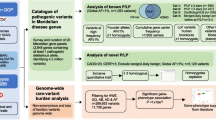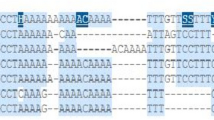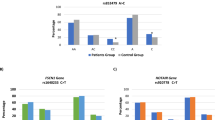Abstract
Purpose
Based on the assumption that genetic factors are involved in the etiology of endometriosis, this study aimed to investigate the possibility of rs498679 (TLR4 gene), rs1799964 (TNF-α gene), rs3024496 (IL-10 gene), and rs2294021 (CCDC22 gene) polymorphisms being associated with the occurrence of this disease in a sample of Brazilian women.
Methods
We conducted a case-control study with 100 women with histological confirmation of endometriosis (endometriosis group) and 100 women submitted to laparoscopy for benign disorders, in which the absence of endometriosis was confirmed (control group). All samples were genotyped by real-time PCR technique for rs498679, rs1799964, rs3024496, and rs2294021 polymorphisms.
Results
No significant difference was observed in genotypic or allelic frequencies between control and endometriosis groups for rs498679 (TLR4 gene), rs1799964 (TNF-α gene), rs3024496 (IL-10 gene), neither when comparing endometriosis subgroups (I–II versus III-IV). On the other hand, significant difference between stages I–II and III–IV of the disease was found in genotypic and allelic frequencies for the rs2294021 (CCDC22 gene) SNP (p = 0.048 and p = 0.017, respectively).
Conclusion
Our results suggest that the rs2294021 (CCDC22 gene) polymorphism could be associated with increased susceptibility to endometriosis in Brazilian women when the allele C is present. In order to clarify this result, further studies should be conducted on a larger population.
Similar content being viewed by others
References
Eskenazi B, Warner ML. Epidemiology of endometriosis. Obstetrics and Gynecology Clinics of North America, Obstet Gynecol Clin North Am. 1997;24(2):235–58.
Harada T, Iwabe T, Tarekawa M. Role of cytokines in endometriosis. Fertil and Steril. 2001;76(1):1–10.
Berkkanoglu M, Arici A. Immunology and endometriosis. Am J Reprod Immunol. 2003;50(1):48–59.
Khan KN, Kitajima M, Fujishita A, Nakashima M, Masuzaki H. Toll-like receptor system and endometriosis. J Obstet Gynaecol Res. 2013;39(8):1281–92.
Suen JL, Chang Y, Chiu PR, Hsieh TH, Hsi E, Chen YC, Chen YF, Tsai EM. Serum level of IL-10 is increased in patients with endometriosis, and IL-10 promotes the growth of lesions in a murine model. Am J Pathol. 2014;184(2):464–71.
Abutorabi R, Baradaran A, Sadat Mostafavi F, Zarrin Y, Mardanian F. Evaluation of tumor necrosis factor alpha polymorphism frequencies in endometriosis. Int J Fertil Steril. 2015;9(3):329–37.
Sampsom JA. Metastatic or embolic endometriosis, due to the menstrual dissemination of endometrial tissue into the venous circulation. Am J Pathol. 1927;3(2):93–110.43.
Dastur AE, Tank PD. John A Sampson and the origins of Endometriosis. J Obstet Gynaecol India. 2010;60(4):299–300.
Hayashi C, Chishima F, Sugitani M, Ichikawa G, Nakazawa-Watanabe T, Sugita K, Suzuki M, Nemoto N, Yamamoto T. Relationship between toll-like receptor-4 and mPGES-1 gene expression in local lesions of endometriosis patients. Am J Reprod Immunol. 2013;69(3):231–9.
Takeda K, Kaisho T, Akira S. Toll-like receptors. Annu Rev Immunol. 2003;21:335–76.
Girling JE, Hedger MP. Toll-like receptors in the gonads and reproductive tract: emerging roles in reproductive physiology and pathology. Immunol Cell Biol. 2007;85(6):481–9.
Young SL, Lyddon TD, Jorgenson RL, Misfeldt ML. Expression of toll-like receptors in human endometrial epithelial cells and cell lines. Am J Reprod Immunol. 2004;52(1):67–73.
Hirata T, Osuga Y, Hirota Y, Koga K, Yoshino O, Harada M, Morimoto C, Yano T, Nishii O, Tsutsumi O, Taketani Y. Evidence for the presence of toll-like receptor 4 system in the human endometrium. J Clin Endocrinol Metab. 2005;90(1):548–56.
Khan KN, Kitajima M, Hiraki K, Yamaguchi N, Katamine S, Matsuyama T, Nakashima M, Fujishita A, Ishimaru T, Masuzaki H. Escherichia coli contamination of menstrual blood and effect of bacterial endotoxin on endometriosis. Fertil Steril. 2010;94(7):2860–3.
Allhorn S, Böing C, Koch AA, Kimmig R, Gashaw I. TLR3 and TLR4 expression in healthy and diseased human endometrium. Reprod Biol Endocrinol. 2008;6(40):1–11.
Ferwerda B, McCall MBB, Verheijen K, Kullberg B, van der Ven AJAM, Van der Meer JWM, Netea MG. Functional consequences of toll-like receptor 4 polymorphisms. Mol Med. 2008;14(5–6):346–52.
Latha M, Vaidya S, Movva S, Chava S, Govindan S, Govatati S, Banoori M, Hasan Q, Kodati VL. Molecular pathogenesis of endometriosis; toll-like receptor-4 A896G (D299G) polymorphism: a novel explanation. Genet Test Mol Biomarkers. 2011;15(3):181–4.
Eisermann J, Gast MJ, Pineda J, Odem RR, Collins JL. Tumor necrosis factor in peritoneal fluid of women undergoing laparoscopic surgery. Fertil Steril. 1988;50(4):573–9.
Rana N, Braun DP, House R, Gebel H, Rotman C, Dmowski WP. Basal and stimulated secretion of cytokines by peritoneal macrophages in women with endometriosis. Fertil Steril. 1996;65(5):925–30.
Qidwai T, Khan F. Tumour necrosis factor gene polymorphism and disease prevalence. Scand J Immunol. 2011;74(6):522–47.
Ruuls SR, Sedgwick JD. Unlinking tumor necrosis factor biology from the major histocompatibility complex: lessons from human genetics and animal models. Am J Hum Genet. 1999;65(2):294–301.
Kyama CM, Overbergh L, Debrock S, Valckx D, Vander Perre S, Meuleman C, Mihalyi A, Mwenda JM, Mathieu C, D'Hooghe TM. Increased peritoneal and endometrial gene expression of biologically relevant cytokines and growth factors during the menstrual phase in women with endometriosis. Fertil Steril. 2006;85(6):1667–75.
Teramoto M, Kitawaki J, Koshiba H, Kitaoka Y, Obayashi H, Hasegawa G, Nakamura N, Yoshikawa T, Matsushita M, Maruya E, Saji H, Ohta M, Honjo H. Genetic contribution of tumor necrosis factor (TNF)-alpha gene promoter (−1031, −863 and −857) and TNF receptor 2 gene polymorphisms in endometriosis susceptibility. Am J Reprod Immunol. 2004;51(5):352–7.
Lakshmi KV, Shetty P, Vottam K, Govindhan S, Ahmad SN, Hasan Q. Tumor necrosis factor alpha –C850T polymorphism is significantly associated with endometriosis in Asian Indian women. Fertil Steril. 2010;94(2):453–6.
Mardanian F, Aboutorabi R, Jefride Y, Amini G. Study of association between promoter tumor necrosing factor alpha gene polymorphisms in -850T/C, −863 A/C, and endometriosis. Adv Biomed Res. 2014;3:1–5.
Lee GH, Choi YM, Kim SH, Hong MA, Oh ST, Lim YT, Moon SY. Association of tumor necrosis factor-a gene polymorphisms with advanced stage endometriosis. Hum Reprod. 2008;23(4):977–81.
Ho HN, Wu MY, Chao KH, Chen CD, Chen SU, Yang YS. Peritoneal interleukin-10 increases with decrease in activated CD4+ T lymphocytes in women with endometriosis. Hum Reprod. 1997;12(11):2528–33.
Malutan AM, Drugan T, Ciortea R, Mocan-Hognogi RF, Bucuri C, Rada MP, Mihu D. Serum anti-inflammatory cytokines for the evaluation of inflammatory status in endometriosis. J Res Med Sci. 2015;20(7):668–74.
Fan W, Li S, Chen Q, Huang Z, Ma Q, Xiao Z. Association between interleukin-10 promoter polymorphisms and endometriosis: a meta-analysis. Gene. 2013;515(1):49–55.
Punnonen J, Teisala K, Ranta H, Bennett B, Punnonen R. Increased levels of interleukin-6 and interleukin-10 in the peritoneal fluid of patients with endometriosis. Am J Obstet Gynecol. 1996;174(5):1522–6.
Podgaec S, Abrao MS, Dias JA Jr, Rizzo LV, de Oliveira RM, Baracat EC. Endometriosis: an inflammatory disease with a Th2 immune response component. Hum Reprod. 2007;22(5):1373–9.
Núñez C, Alecsandru D, Varadé J, Polanco I, Maluenda C, Fernández-Arquero M, de la Concha EG, Urcelay E, Martínez A. Interleukin-10 haplotypes in Celiac Disease in the Spanish population. BMC Med Genet. 2006;7(32):1–5.
Assis S, Marques CR, Silva TM, Costa RS, Alcantara-Neves NM, Barreto ML, Barnes KC, Figueiredo CA. IL10 single nucleotide polymorphisms are related to upregulation of constitutive IL-10 production and susceptibility to helicobacter pylori infection. Helicobacter. 2014;19(3):168–73.
Mishra A, Nizamuddin S, Arekatla G, Prakash S, Dewangan H, Dominic A, Mishra A, Sudhakar DV, Parine NR, Tupperwar NC, Thangaraj K. IL10 variant g.5311A is associated with visceral leishmaniasis in Indian population. PLoS One. 2015;10(5):1–16.
Saxena D, Misra MK, Parveen F, Phadke SR, Agrawal S. The transcription factor Forkhead Box P3 gene variants affect idiopathic recurrent pregnancy loss. Placenta. 2015;36(2):226–31.
Starokadomskyy P, Gluck N, Li H, Chen B, Wallis M, Maine GN, Mao X, Zaidi IW, Hein MY, McDonald FJ, Lenzner S, Zecha A, Ropers HH, Kuss AW, McGaughran J, Gecz J, Burstein E. CCDC22 deficiency in humans blunts activation of proinflammatory NF-κB signaling. J Clin Invest. 2013;123(5):2244–456.
Podgaec S, Barbeiro DF, Gueuvoghlanian-Silva BY, Bellelis P, Abrão MS, Baracat EC. Foxp3 expression in deep rectosigmoid endometriosis lesions and its association with chronic pelvic pain. J Reprod Immunol. 2014;104-105:96–9.
Lin YC, Lee JH, Wu AS, Tsai CY, Yu HH, Wang LC, Yang YH, Chiang BL. Association of single-nucleotide polymorphisms in FOXP3 gene with systemic lupus erythematosus susceptibility: a case–control study. Lupus. 2011;20(2):137–43.
Revised American Society for Reproductive Medicine classification of endometriosis: 1996. Fertil Steril. 1997; 67(5): 817–21.
Miller SA, Dykes DD, Polesky HF. A simple salting out procedure for extracting DNA from human nucleated cells. Nucleic Acids Res. 1988;16(3):1215.
Asghar T, Yoshida S, Kennedy S, Negoro K, Zhuo W, Hamana S, Motoyama S, Nakago S, Barlow D, Maruo T. The tumor necrosis factor-a promoter 21031C polymorphism is associated with decreased risk of endometriosis in a Japanese population. Hum Reprod. 2004;19(11):2509–14.
Malutan AM, Drugan C, Walch K, Drugan T, Ciortea R, Mihu D. The association between interleukin-10 (IL-10) 2592C/A, 2819T/C, 21082G/A promoter polymorphisms and endometriosis. Arch Gynecol Obstet. 2017;295:503–10.
Acknowledgments
This study was supported by FAPESP (Fundação de Amparo à Pesquisa do Estado de São Paulo) and Laboratório de Investigação Médica (LIM-40).
Author information
Authors and Affiliations
Corresponding author
Ethics declarations
Conflict of interest
The authors declare they have no conflicts of interest.
Rights and permissions
About this article
Cite this article
de Oliveira Francisco, D., de Paula Andres, M., Gueuvoghlanian-Silva, B.Y. et al. CCDC22 gene polymorphism is associated with advanced stages of endometriosis in a sample of Brazilian women. J Assist Reprod Genet 34, 939–944 (2017). https://doi.org/10.1007/s10815-017-0936-0
Received:
Accepted:
Published:
Issue Date:
DOI: https://doi.org/10.1007/s10815-017-0936-0




